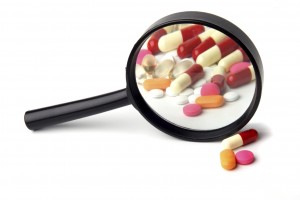Medications for bipolar disorder
Medications that have shown the most benefit in the treatment of bipolar disorder include mood stabilizers and atypical antipsychotics.1,2 The use of antidepressants alone to treat bipolar disorder is not recommended as they may trigger hypomania, mania, mixed states and rapid cycling.3 Anti-anxiety medications (benzodiazepines) are sometimes used for short periods in conjunction with a person’s usual medications to relieve restlessness, anxiety, panic or insomnia. Different medications and combinations may be used to reduce different kinds of bipolar episodes.
disorder include mood stabilizers and atypical antipsychotics.1,2 The use of antidepressants alone to treat bipolar disorder is not recommended as they may trigger hypomania, mania, mixed states and rapid cycling.3 Anti-anxiety medications (benzodiazepines) are sometimes used for short periods in conjunction with a person’s usual medications to relieve restlessness, anxiety, panic or insomnia. Different medications and combinations may be used to reduce different kinds of bipolar episodes.
More on medications for bipolar disorder and how they help.
Electroconvulsive therapy (ECT)
When a person is severely depressed or at risk (e.g. they have stopped eating or sleeping, or are very suicidal) and other treatments don’t seem to help, ECT can be effective in stabilizing mood.4 It is most beneficial in reducing severe depression. However, it can help to reduce other types of severe symptoms. In ECT the person is given an anesthetic, and electrical stimulation is applied to a specific area of the brain. Temporary confusion or loss of memory may occur for a certain time after treatment.
Additional treatments
- Some studies have found Omega-3 fatty acids helpful in reducing depression when added to the person’s usual medications.5
- If a person is deficient in vitamin D, folate or vitamin B12 (this can be checked with a blood test), taking supplements in addition to their usual medication may help to reduce depression. However, these supplements have not been comprehensively studied in people with bipolar disorder.6
- St John’s Wort has not been studied for use in bipolar disorder and can have a negative effect when taken with certain medications prescribed for bipolar disorder.
- Exercise is helpful in reducing depression and has additional general health benefits. 7 There is some evidence of benefits in reducing bipolar depression and anxiety. 8
- Research to improve the treatment of bipolar disorder is ongoing and there are some treatments currently being tested such as the antioxidant N-acetyl cysteine(NAC), which may have some benefit in reducing bipolar depressive symptoms when combined with the person’s usual treatment, and ketamine, but more information is required before they are generally recommended. 9,10
PLEASE NOTE: The information in this guide is introductory and for any treatment decisions and more information we recommend you consult a clinician. In addition, there are also treatment guidelines you can refer to listed in the resources section.
References
- Smith LA, Cornelius V, Warnock A, et al. Effectiveness of mood stabilizers and antipsychotics in the maintenance phase of bipolar disorder: a systematic review of randomized controlled trials. Bipolar Disord 2007; 9(4): 394-412.
- Baldessarini RJ, Tondo L, Davis P et al. Decreased risk of suicides and attempts during long-term lithium treatment: a meta-analytic review. Bipolar Disord 2006; 8: 625-639.
- Baldessarini RJ, Calabrese JR, Tohen M, Bowden CL. Bipolar depression: Overview and commentary. Harvard Rev of Psychiat 2010; 18(3): 143-157.
- Payne NA, Prudic J. Electroconvulsive Therapy: Part I. A Perspective on the Evolution and Current Practice of ECT. J Psychiatr Pract 2009; 15: 346-368.
- Kraguliac NV, Montori VM, Pavuluri M et al. Efficacy of omega-3 Fatty acids in mood disorders – a systematic review and metaanalysis. Psychopharmacol Bull 2009; 42(3): 39-54.
- Barnard K, Colón-Emeric C.Extraskeletal effects of vitamin D in older adults: cardiovascular disease, mortality, mood and cognition. Am J Geriatr Pharmacother 2010; 8(1): 4-33.
- Barbour KA, Edenfield TM, Blumenthal JA. Exercise as a treatment for depression and other psychiatric disorders: A review. J Cardiopulm Rehabil 2007; 27(6): 359-367.
- Ng F, Dodd S, Berk M. The effects of physical activity in the acute treatment of bipolar disorder: A pilot study. J Affect Disord 2007; 101: 259-262.
- Berk M, Copolov DL, Dean O et al. N-Acetyl Cysteine for Depressive Symptoms in Bipolar Disorder—A Double-Blind Randomized Placebo-Controlled Trial. Biol Psychiatry 2008; 64(6):468-475.
- Zarate C, Rodrigo MV, Ioline H, Glutamatergic modulators: the future of treating mood disorders? Havard Rev Psychiat 2010; 18(5): 293-303.
